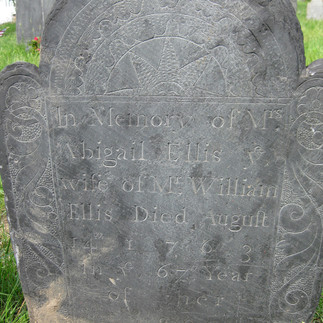Gravestone Symbolism In Old Parish Cemetery
- Patricia Fanning

- Oct 29, 2021
- 2 min read
Updated: Dec 28, 2022
Abigail Millett Ellis (1696-1763)
Mary Everett (1760-1801)

Early New England gravestones were rife with symbolism: the hour-glass, the winged death’s-head, and the trumpet each carried a message to the passer-by. The hour-glass was an obvious reference to the passage of time and its fleeting nature. Death’s-heads and cross-bones were visual indications of mortality. The trumpet was a common symbol meant to remind the visitor of the familiar words of scripture that referenced the sounding of trumpets and the raising of the dead on the last day.
Similarly, the rising sun is a very obvious symbol of the resurrection, eternal life, and the eternal light of heaven. While the setting sun symbolizes death and the end of one’s earthly life, the rising sun evokes the promise of renewed life and the beginning of life after death.
In Old Parish Cemetery, there are two gravestones that use the sun as their dominant symbol.
Each is distinctive in its own way.
Abigail Ellis, wife of William Ellis, was born in Gloucester on November 2, 1696. She married William Ellis of Dedham on October 27, 1720. The couple had eight children born between 1721 and 1738. Abigail died on August 14, 1763. She was 67 years old. Her gravestone (lot 153), was completed by John New of Wrentham. The eyes of the sun just breaking the horizon with ornate rays exploding into the varied shapes and swirls carved into concentric semi-circles on the stone’s tympanum are an example of New’s inventive design-work.
Mary Smith was born on June 23, 1760 in Stoughton and married Abel Everett on September 1, 1779 in that town. She gave birth to ten children, from 1780 until 1796, and died on March 17, 1801. The lettering and design on Mary’s stone (lot 121) by an as yet unidentified carver, remains crisp and distinct over 200 years later. The arch on this stone depicts a well-balanced sun with bright eyes and radiating sunbeams, complemented by well-defined floral side border panels. The dramatic carving of the single word Sacred on the first line of the stone’s tablet assures the passer-by that Mary is confident of her eternal life in heaven.

















Comments